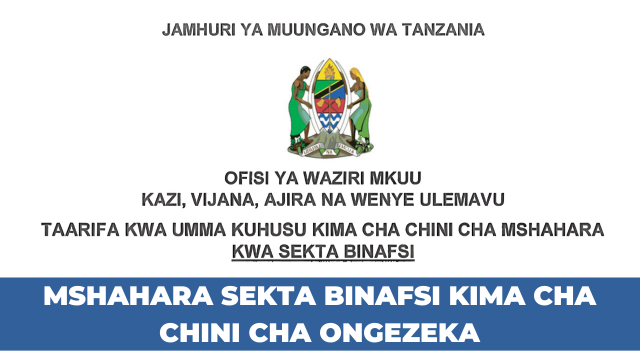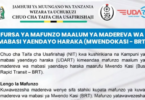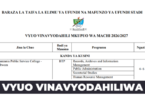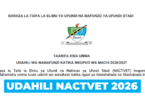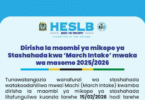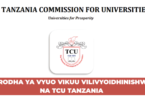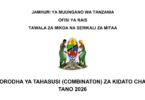The Government of the Sixth Phase Administration has officially announced a significant 33.4% increase in the minimum wage for private sector employees—a major move aimed at improving worker motivation, productivity, and overall economic growth across the country, Private Sector Minimum increase, Tanzania Hikes Private Sector Minimum Wage by 33%.
A Historic Step to Empower Tanzanian Workers
In a press briefing held in Dar es Salaam on October 17, 2025, the Minister of State in the Prime Minister’s Office (Labour, Youth, Employment and Persons with Disabilities), Hon. Ridhiwani Kikwete, confirmed that the new wage adjustment process has been completed in accordance with Section 39(1) of the Labour Institutions Act, Chapter 300. The new wage structure marks a major policy milestone under President Samia Suluhu Hassan’s administration, focusing on improving living standards and ensuring fair compensation for Tanzanian workers.
Key Highlights of the New Minimum Wage Order
According to Minister Kikwete, the number of wage categories has increased from 13 sectors in 2022 to 16 in 2025, while sub-sectors have expanded from 25 to 46.
Below is a quick overview of the key figures:
| Category | Previous (2022) | New (2025) | Effective Date |
|---|---|---|---|
| Minimum Monthly Wage | TZS 275,060 | TZS 358,322 | January 1, 2026 |
| Average Increase | — | 33.4% | — |
| Number of Sectors | 13 | 16 | — |
| Number of Sub-sectors | 25 | 46 | — |
Sectors Covered Under the New Minimum Wage
The new wage order applies to a broad range of industries in the private sector, including:
- Agriculture
- Health services
- Communications
- Transport and logistics
- Mining and industrial sectors
- Hospitality and tourism (hotels and restaurants)
- Private schools and education services
- Private security services
- Energy, fishing, and marine services
- Sports and culture sectors
- And other emerging service industries
Stakeholders Commend the Government’s Effort

Inclusive and Participatory Process
The Chairperson of the Minimum Wage Board for the Private Sector, Dr. Suleiman Rashid Mohamed, praised the process for being inclusive. He highlighted that employers, employees, and labor unions all participated actively in discussions before the final decision was reached.
A Relief for Workers Nationwide
The Deputy Secretary-General of the Trade Union Congress of Tanzania (TUCTA), Rehema Ludanga, welcomed the government’s decision, describing it as “a clear demonstration of the government’s commitment to improving workers’ welfare.” She urged private sector employers to implement the new wage promptly and, where possible, offer even higher pay to further enhance employee welfare and motivation.
Support from Employers’ Association
Suzanne Ndomba-Doran, the Chief Executive Officer of the Association of Tanzania Employers (ATE), confirmed that ATE actively participated in the expert committee that reviewed and harmonized proposals from all regions. She encouraged employers to begin reviewing and adjusting their payroll systems before January 1, 2026, to ensure compliance with the new directive. ATE, she added, will continue to educate and guide employers on how to implement the new wage structure effectively.
Looking Ahead
The new minimum wage marks a turning point for Tanzania’s labor market, setting a foundation for fair compensation, social justice, and sustainable economic growth. By increasing the wage floor, the government aims to strengthen the private sector’s contribution to the national economy while safeguarding the dignity and well-being of every Tanzanian worker.
